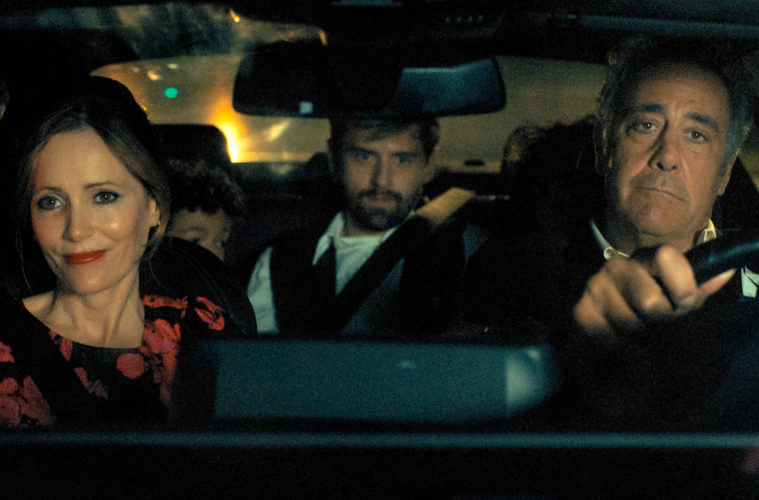 Twenty-five year-old actor-writer-director Cooper Raiff has followed his terrific indie comedy, Shithouse (2020) with Cha Cha Real Smooth, a more serious-minded film that feels slow at times but is so earnestly intent on seeing its characters through to a fully felt emotional resolution that most will forgive the lack of narrative pull. Raised in Dallas, Texas, Raiff has reported that he spent his teen years attending the bar mitzvahs and bat mitzvahs of his Jewish friends, which explains both the plot of his new film, and its title, a nod to DJ Casper’s ubiquitous party anthem, Cha Cha Slide.
Twenty-five year-old actor-writer-director Cooper Raiff has followed his terrific indie comedy, Shithouse (2020) with Cha Cha Real Smooth, a more serious-minded film that feels slow at times but is so earnestly intent on seeing its characters through to a fully felt emotional resolution that most will forgive the lack of narrative pull. Raised in Dallas, Texas, Raiff has reported that he spent his teen years attending the bar mitzvahs and bat mitzvahs of his Jewish friends, which explains both the plot of his new film, and its title, a nod to DJ Casper’s ubiquitous party anthem, Cha Cha Slide.
As Cha Cha Real Smooth (on Apple TV+ now) opens, a 12-year-old boy named Andrew (Javien Mercado) is attending a friend’s New Jersey bar mitzvah. It’s a good party but Andrew can’t take his eyes off Bella (Kelly O’Sullivan), the young woman who’s been hired as the “party starter.” She gets the kids up and dancing. Andrew is smitten, especially after he sees Bella soldier on with a smile after taking an intense and tearful phone call in the stairwell. Andrew tells his mom (Leslie Mann) he’s in love. “Are you sure, babe?” she asks. “Sure, sure?”
It could be said that Cha Cha Real Smooth never quite tops its pitch perfect prologue, but either way, ten years later, Andrew (now played by Raiff), is a 22-year-old fast food worker who finds a new career as a party starter after saving the day at a bat mitzvah he attends with his mother. Mann’s character is bi-polar so Andrew has a gift for reading the room, and for knowing how to inspire people to look past the fears that keep them rooted to their chairs, be they thirteen, thirty, or sixty.
On this night, he inspires Lola (Vanessa Burghardt), the teenage autistic daughter of Domino (a superb Dakota Johnson) to come out of her shell. Domino is a single mom with a fiancé, Joseph (Raúl Castillo), who’s always away on business. Lola dances and dances some more, which thrills her mom. She’s deeply grateful to Andrew, and invites him to be a friend to her and Lola.
In a remarkable sequence, Andrew is there for Domino when she suffers a deeply personal medical emergency in the middle of another party. Soon, he’s babysitting Lola and having midnight talks with Domino. They kiss, once, but this isn’t a love story. Or perhaps it is. Andrew himself can’t decide.
Burghardt, a neurodiverse actress making her film debut, gives a delightful performance, and also one that appears to have inspired a deep level of awareness in her director. When Andrew wonders if he’s tiring her with his non-stop chatter, Lola says she doesn’t thrive on social interaction (as Andrew does) but sometimes likes to lie alone in an empty room. Raiff then cuts to Lola in her room, alone, relishing its space and quiet, and almost seeming to orchestrate it with her hands. The movie year isn’t likely to see another moment as generous and fine.
Finding similar grace notes for Andrew proves to be more of a challenge. At 22, grace is elusive, and usually can’t be trusted. He seems to drink too much, which Raiff’s screenplay never quite acknowledges. Is the fiance, Joseph, a jerk? That would make things simple. Andrew could be Domino’s rescuer.
Rescue is what he does, after all, or has wanted to do, ever since he saw Bella the party starter crying in the stairwell when he was twelve. When truths about his place in Domino and Lola’s life break his heart, Andrew reaches out to his mother, just as he did when Bella disappointed him, ten years back. We repeat our patterns, and rarely know it.
“I want you to do your twenties,” Domino tells Andrew at one point, and in his first two feature films, that’s what Cooper Raiff appears to be trying to do through his characters. Be fully twenty-something. That means Andrew talks too much, takes himself too seriously, and has trouble getting out the door. He doesn’t know about clean exits, so he goes back for one more. He can’t help but double down on the pathos. Which is surely the very nature of being a young adult.
Editor’s note: The disclaimer below refers to advertising posts and does not apply to this or any other editorial stories. LA Weekly editorial does not and will not sell content.
Advertising disclosure: We may receive compensation for some of the links in our stories. Thank you for supporting LA Weekly and our advertisers.

